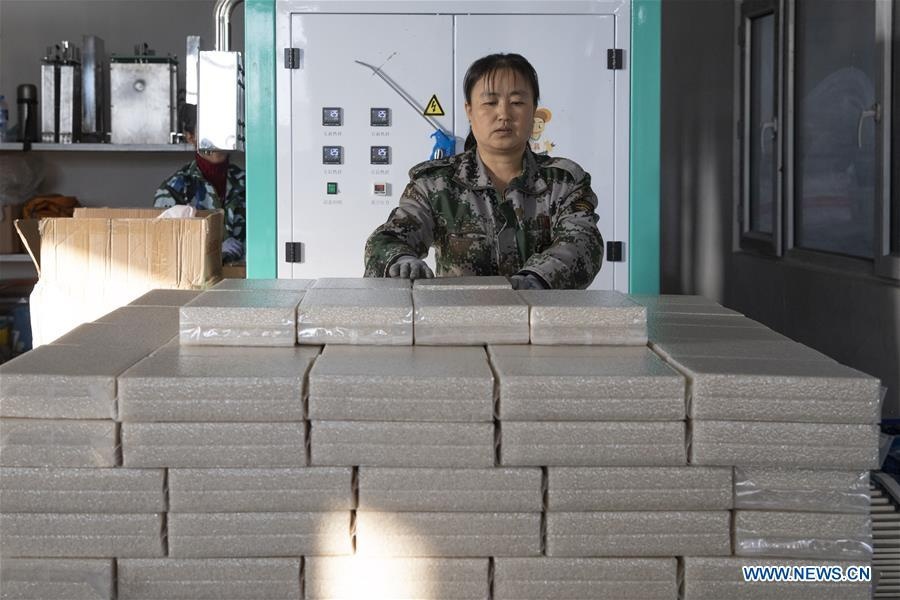
A worker arranges rice packages at a rice processing factory in Ning'an City, northeast China's Heilongjiang Province, Oct. 27, 2020. Autumn harvest in Ning'an has mostly finished, while food processing enterprises hum. (Xinhua/Zhang Tao)
Manufacturers of home appliances in China are seeing a boom in international orders, as the world continues to struggle through the COVID-19 crisis and China plows on as the only major manufacturing engine.
Factories in Foshan, South China's Guangdong province, where home appliances companies traditionally congregate, are beginning to complain that the volume of orders has weighed on their production capacity. Labor shortages have driven up local salaries, yet companies are still unable to meet demand and have been forced to stop taking orders.
Flying Fish group, a company based in Foshan, has seen exports jump over a staggering 600 percent this year. Products such as humidifiers and vacuum cleaners are in particular demand.
Another company producing coffee machines began to notice a rise in export orders from May, when the negative impacts of COVID-19 started to subdue in China.
The exponential growth in the export of home appliances is attributable to the worldwide lockdown, with people forced to spend more time in their homes. According to statistics from iiMedia, a research firm, China's export of electric woks increased 62.9 percent. Kitchen appliances such as toasters and blenders are also up 34.7 percent and 12.1 percent.
The booming demand is driving not just orders, but also the emergence of new businesses. According to tianyancha.com, a company information platform, from March to April, the number of registered home appliance makers in China rose to 36,000, almost triple the 12,000 registered in the January to February period.
However, the increasing global demand and temporary closure of other factories in other countries has heavily burdened the Chinese manufacturers' production capacity, with some now refusing new orders due to limited labor availability.
Zhao Rui, a manager from a home appliance company based in Foshan, said that the factory has increased its workforce to 450 people from 300, but most workers still have to work overtime to finish orders.
According to Zhao, the busiest season of the year usually comes in October, but now despite trying different recruiting platforms and channels, they still can't find enough workers to fill the orders, and they have decided to stop take new international orders as of this month.
The explosion of orders in home appliances lends further credence to the picture of robust recovery in China's manufacturing sector as a whole. Emerging from COVID-19 disruptions, the Chinese furniture industry is also picking up momentum as more export orders arrive, helping the sector to become one of the fastest industries to recover from the epidemic-related slowdown seen in the first half of the year.
In Shunde, a district of Foshan city in South China's Guangdong Province and a furniture manufacturing hub, floods of international client phone calls and countless trucks being loaded for export are common scenes, local industry players told the Global Times on Thursday.
"Following the order boom, our factory increased its workforce by 30 percent in September, but it's still not enough. Now we are talking about orders for January and February next year," a manager from the company said.
Furniture factories are working around the clock, but they are struggling to find the people needed to do the job.
"We've had a shortage of hands since the second quarter, when orders started to surge," said a company representative surnamed Quan. "At first we wanted to hire experienced workers, but now we are also accepting more apprentices to fill the gap."
According to Quan, the company currently has around 5,300 factory workers, but there are still around 200 vacancies. Hiring teams from the company have travelled as far as Southwest China's Yunnan Province and Northern China's Inner Mongolia to recruit new workers, whereas in the past most employees were local or from nearby cities.
Some companies have raised salaries for frontline workers by 30 to 40 percent during this peak season. Starting salaries for workers on the assembly line in Henglin Home Furnishings, a manufacturer based in East China's Zhejiang Province, have been increased to 8,000 ($1,192) to 10,000 yuan per month, a very reasonable amount in any region and far exceeding the average salary of university graduates of around 5,290 yuan, calculated by job seeking platform zhilianzhaopin.com in September.
Manufacturers worry that the rapidly surging demand for labor might be exposing a murkier side to this picture. Some are worried that the frenzy will leave companies in China overstaffed with expensive workers and overstocked with inventory, and others are concerned about rising international logistics costs.
"Prices for cargo containers have almost doubled to $4,000 this month, driven by demand," Xu Qing, a manger from a home appliances company from Foshan said, "But sometimes we still can't get a container because the supply is tight."


